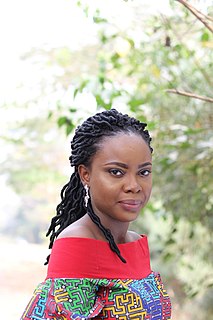A Quote by Ayobami Adebayo
I used to think that most published writers, the ones I admired, had a muse, or a special connection to the universe, to nature, or to aliens - something inaccessible to me that caused their prose to flow onto the page, already perfect.
Related Quotes
For me a page of good prose is where one hears the rain. A page of good prose is when one hears the noise of battle.... A page of good prose seems to me the most serious dialogue that well-informed and intelligent men and women carry on today in their endeavor to make sure that the fires of this planet burn peaceably.
In general, I would think that at present prose writers are much in advance of the poets. In the old days, I read more poetry than prose, but now it is in prose where you find things being put together well, where there is great ambition, and equal talent. Poets have gotten so careless, it is a disgrace. You can’t pick up a page. All the words slide off.
Pretty much every issue that we've put out, there have been at least one or two things that really surprised me. It sounds like bullshit, but most of the stories that we've run had that effect on me. We get thousands and thousands of submissions and I don't think we've published a story yet - very few, anyway - where there wasn't something like what Mona Simpson described, where a first sentence or a first page didn't just really command attention.
I feel like the reason I ended up becoming a playwright is because I never choose the right word. As a kid, my fantasy profession was to be a novelist. But the thing about writing prose - and maybe great prose writers don't feel this way - but I always felt it was about choosing words. I was always like, "I have to choose the perfect word." And then it would kill me, and I would choose the wrong word or I would choose too many perfect words - I wrote really purple prose.
I feel like the older I get, the truer it feels that I'm only going have an investment in a poem if it allows or forces me to bring something that's supremely me onto the page. I used to think that the speaker of a poem was talking to someone else, to some ideal reader or listener, but now I think that speakers - poets - are talking to themselves. The poem allows you to pose questions that you have you ask of yourself knowing that they are unanswerable.
Or, to express this in another way, suggested to me by Professor Suzuki, in connection with seeing into our own nature, poetry is the something that we see, but the seeing and the something are one; without the seeing there is no something, no something, no seeing. There is neither discovery nor creation: only the perfect, indivisible experience.
The way something looks or sounds is also what it means. Words as visual and aural phenomena, which mainly poets, not critics and prose writers, tend to be obsessed with. I think maybe I'm more of a curator than I am a writer in the strict sense because I am interested in how everything on the page, in a space, works together.






































